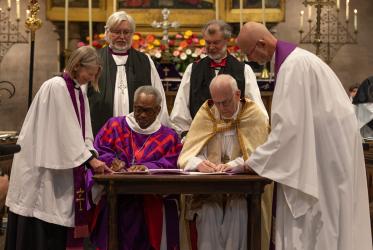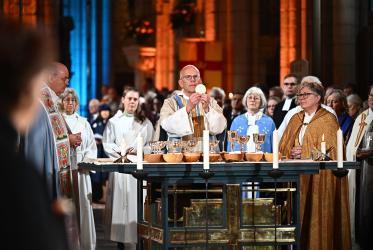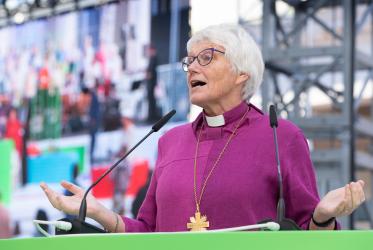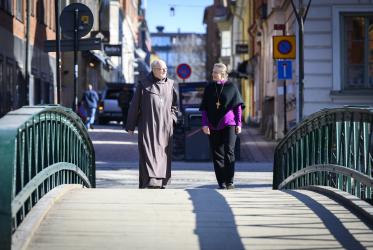Kirche von Schweden
(Svenska kyrkan)
Christianity in Sweden traces its beginnings to the missionary endeavours of St Ansgar (801-865), the first archbishop of Hamburg and the "Apostle of Scandinavia". Pagan traditions were finally overcome in the 11th century by German and English missionaries. The archdiocese of Uppsala, an influential order founded by St Bridget (at Vadstena) and the University of Uppsala (1477) were signs of the church's growing strength during the centuries before 1500. The Reformation was introduced in 1527 under King Gustavas Vasa, and the first Lutheran archbishop of Uppsala was appointed in 1531. In 1593, the convocation of clergy in Uppsala affirmed the position of the Church of Sweden as Lutheran. The unaltered Augsburg Confession was adopted as the doctrinal norm and the historic episcopacy was kept.
The Church of Sweden has been an established church. Until the 19th century it was the only church recognized by the state and its affairs were regulated by the parliament. It was only in the second half of the 19th century that a church assembly was established. Much further debate took place during the 20th century and various adjustments were made, loosening the close connection with the state. The present situation is controlled by a radical set of laws, which came into force on 1 January, 2000. The Church of Sweden was disestablished and declared a "faith-community".
The description national church (folk church) became popular in the 20th century as an alternative to state church. It denotes a church which embraces the whole country so that every part is in a parish with a local parish church; the Church of Sweden is not therefore a gathered church, ministering only to those who actively belong. Every fourth year elections are held for all the decision-making bodies at parish, diocesan and national level. Every member of the Church of Sweden over the age of 16 is entitled to vote. To be a candidate for office one has to be a member, baptized and at least 18. Alongside this democratic element is the episcopal structure which the Church of Sweden has inherited from the past. The bishops supervise the parishes and the ordained deacons and clergy. This ensures that deacons and clergy, although employed by the parish, are bound by their ordination vows to the church's faith, confession and teaching and have a special ministerial relationship to their diocese and bishop.
Some 70 percent of the population are brought for baptism by their parents and about 50 percent go forward for confirmation in their early teens. About the same percentage are married by the church and some 90 percent are buried with a Church of Sweden service. In 2000 a new translation of the Holy Bible was adopted. There are some 40 Church of Sweden churches in 25 countries in the world. These minister to students, tourists, seamen and Swedes living abroad. The Church of Sweden is engaged in international diaconal work, such as long-term development, advocacy and emergency relief, in cooperation with the Lutheran World Federation, World Council of Churches and Action by Churches Together. It is also engaged in international missionary work in relationship with churches and ecumenical organizations in Africa, Asia, Latin America and the Middle East. In Sweden some 10,000 volunteers are engaged in giving information, collecting money and shaping opinion for the international church work. Roughly USD 30 million are contributed every year in Sweden for this work.
The Church of Sweden has signed the Porvoo Agreement. It participates in the theological work of the CPCE but has not signed the Leuenberg Agreement. In 2006 the Church of Sweden signed an agreement with the Mission Covenant Church of Sweden recognizing "each other as apostolic churches .... holding the same confession of the apostolic faith" and "the same understanding of the sacrements".





